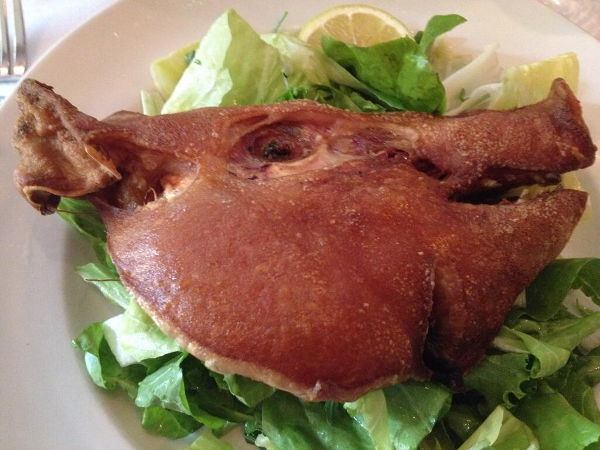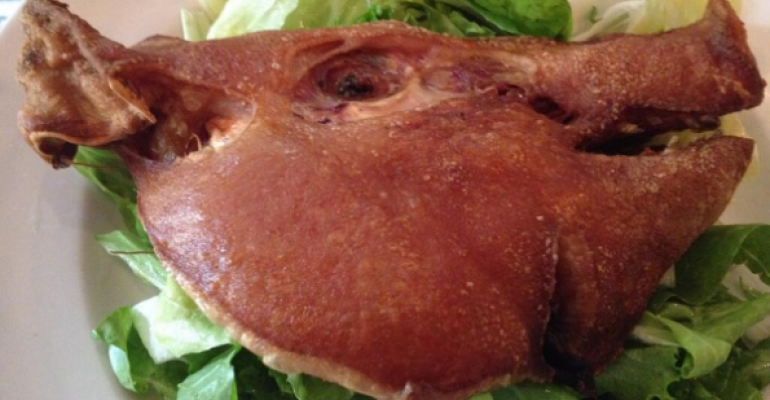 Don’t eat anything with a face.
Don’t eat anything with a face.
That was the motion put forward in the Intelligence2 debate I attended last night.
The Oxford-style debates were introduced to New Yorkers in 2006 and are aired on National Public Radio. They tend to be about broad issues of national or global concern; upcoming motions include “Obamacare is now beyond rescue,” “Labor unions are the enemy of the middle class,” and “Russia is a marginal power.”
What we eat is quite arguably a global concern as well, of course, but it’s also highly personal, and about as intimate as you can get.
The motion itself is not a new notion: Phoebe on the hit TV series Friends advocated it, and that was by no means the first time I’d heard that approach, but I was invited to attend the debate and, never having been to an IQ2 debate, as they’re called, I thought it would be fun to see what they’re all about.
It was a great discussion by intelligent people positing opposing philosophies, albeit all from the fringes of mainstream society.
Those speaking in favor of eating only faceless things actually went beyond that and advocated for a completely vegan diet.
They were Neal Barnard, president and founder of the Physicians Committee for Responsible Medicine — an organization that pushes for a vegan diet any chance it gets, I would argue at the expense of science (I once heard a PCRM lawyer say that dairy causes osteoporosis) — and Gene Baur, president and co-founder of Farm Sanctuary, which considers the consumption of animals to be flat-out barbaric.
On the pro-face-eating side were Joel Salatin, the naturalist farmer who was a protagonist in Michael Pollan’s anti-Big Food book The Omnivores Dilemma, and Chris Masterjohn, an honest-to-goodness nutrition scientist, albeit one with a personal grudge against veganism, because he developed some serious health problems when he tried being a vegan (his partner’s a vegan, however, so although a vegan diet might rub his own constitution the wrong way he doesn’t have a problem with others being vegan).
All of them dismissed mainstream animal husbandry at the outset — that’s what they and many others call “factory farming,” which they all seemed to agree was unsound ecologically and bad for human health as well as for the welfare of the animals involved in it.
So that position by itself put them on the margins of public opinion. I tweeted that the debate was the left vs. the far left, and was chastised by a paleo diet advocate who said Chris Masterjohn wasn’t left wing. Indeed, after looking at some of what he’s written, he’s actually a diligent scientist with no axe to grind that would overwhelm his own desire for scientific rigor.
Joel Salatin laughed at the debate after-party when I suggested to him that he was left wing; he said he was a libertarian.
So O.K. It’s still fair to say that their views are at the margins of public opinion.
The IQ2 organizers seemed genuinely shocked and hurt when I mentioned that to them, even though the debate’s program notes state that only 2.5 percent of Americans polled in 2011 claimed to eat no animal products — a number that sounds high to me. Last time I checked with the American Vegetarian Association, and that was earlier this year, the self-declared vegetarian population was only between 4 percent and 6 percent, and many of those people are unclear on the concept and eat chicken and fish.
And of course even non-vegan vegetarians eat butter and eggs.
But I digress. A lot.
For the studio audience — one member of whom accused Salatin of being “speciesist” — the debaters seemed like a good fit.
In fact, the results of the debate, which the audience voted on, bore that out.
Before the debate started, a full 24 percent of the audience favored not eating things with a face, 51 percent were opposed to not eating things with a face (i.e. they thought it was okay to eat meat) and 25 percent were undecided.
They were overwhelmingly persuaded by Dr. Barnard and Mr. Baur. A whopping 45 percent were for the motion by the end of the debate, 43 percent were opposed and 12 percent were undecided.
I was flabbergasted, and for a brief moment thought that perhaps I had become a right-wing kook when it came to the consumption of dead animals.
Don’t get me wrong; the pro-motion team made compelling points that animals are bad for you — contributing to heart disease and cancer — and that killing animals is mean.
But I thought the other side did a great job at pointing out that purely vegan diets, health-wise, aren’t for everyone, that the nutrients in animal fat and animal protein are hard to get elsewhere, that saying “don’t eat anything with a face” is excessively absolutist and that eating animals is part of the natural order of things.
Both also made good cases, respectively, for the environmental impact of eating meat and the potential sustainability of it if you do it the way Mr. Salatin does.
Of course, you can decide for yourself: watch the debate here.
I wondered how so many people could be persuaded that it’s never okay to eat an animal. Surely they’d heard these arguments before, paid attention when Morrissey, Alicia Silverstone and other big celebrities have explained why they’re vegan, and read the reports of the possible ill effects of eating meat.
And then, later that night, as I was drifting off to sleep, I realized that maybe they hadn’t. Of course they hadn’t.
Vegans tell me with some frequency that if only I knew what they know about how our food is raised, I’d be a vegan, too. They seem unaware that in the course of my job I visit farms — even mainstream “Big Food” “Factory Farms” — poke around, ask questions and hear arguments from all sides about how our food is created. They don’t seem to think that, as someone who has devoted his career to writing about food, I’ve explored these issues all my life, starting when I was four years old and, during a fishing trip, saw a rainbow trout that someone caught get its head deliberately smashed on a rock (deliberately by the smasher, not by the fish, obviously).
I’ve pondered, I’ve wondered, I’ve intellectualized and I’ve concluded that I’m fine not only with eating things with a face, but eating their faces.
“You must have spent a lot of time in Europe,” a journalist in back of me said when I mentioned that before the debate started.
“Asia,” I said, although I did go to cooking school in France, where the chickens brought into the kitchens still had heads and pinfeathers. I’ve spent more time in Asia, though.
“Oh, well they’ll eat anything there,” she said.
“Yes,” I said, “because of the poverty.”
I was being kind of a jerk.
Today I had lunch with a guy who before Thanksgiving took his kids, aged 3 and 5, to the turkey farm to meet their dinner. They looked at it and touched it, and then they went home and they ate it.
I think that’s the way it should be. We should absolutely understand where our food comes from. And if you have a problem with the fact that we raise animals for food, kill them and eat them, then you shouldn’t eat them.
At the after-party I asked Dr. Barnard about some of his research. I asked politely because I was genuinely curious and am open to learning new things. That might have been why he later said I was a "future vegan" — that eventually I would see the light. Perhaps he assumed my judgment was clouded by the fact that I work for a business-to-business publication that he said is "skeptical" of people like him.
I don't think Nation's Restaurant News has any opinion of the PCRM, but I sure do; I’ve expressed it before and I stated it above. Would I be healthier as a vegan? I probably would be. Would I be happier? I doubt it. Giving up all those delicious faces, like the one pictured at the beginning of this blog entry, which I ate at Maialino restuarant in New York City earlier this year, would diminish my capacity for joy, just as eating animals would, I have little doubt, diminish Mr. Baur's joy and that of other members of Farm Sanctuary.
I’m glad the world’s big enough to hold all of us.
December 11: This blog entry has been updated to correct typographical errors.

